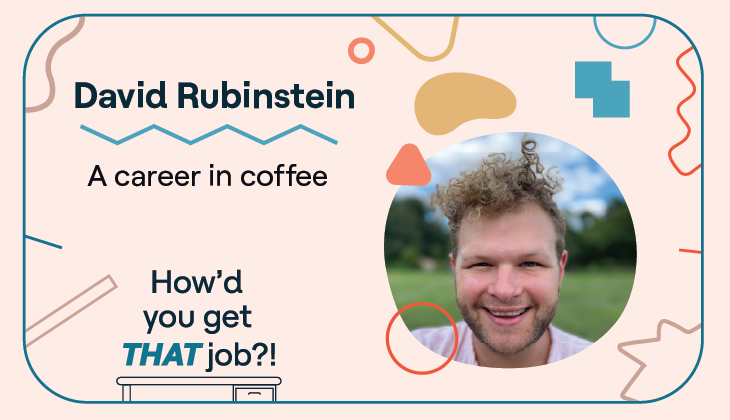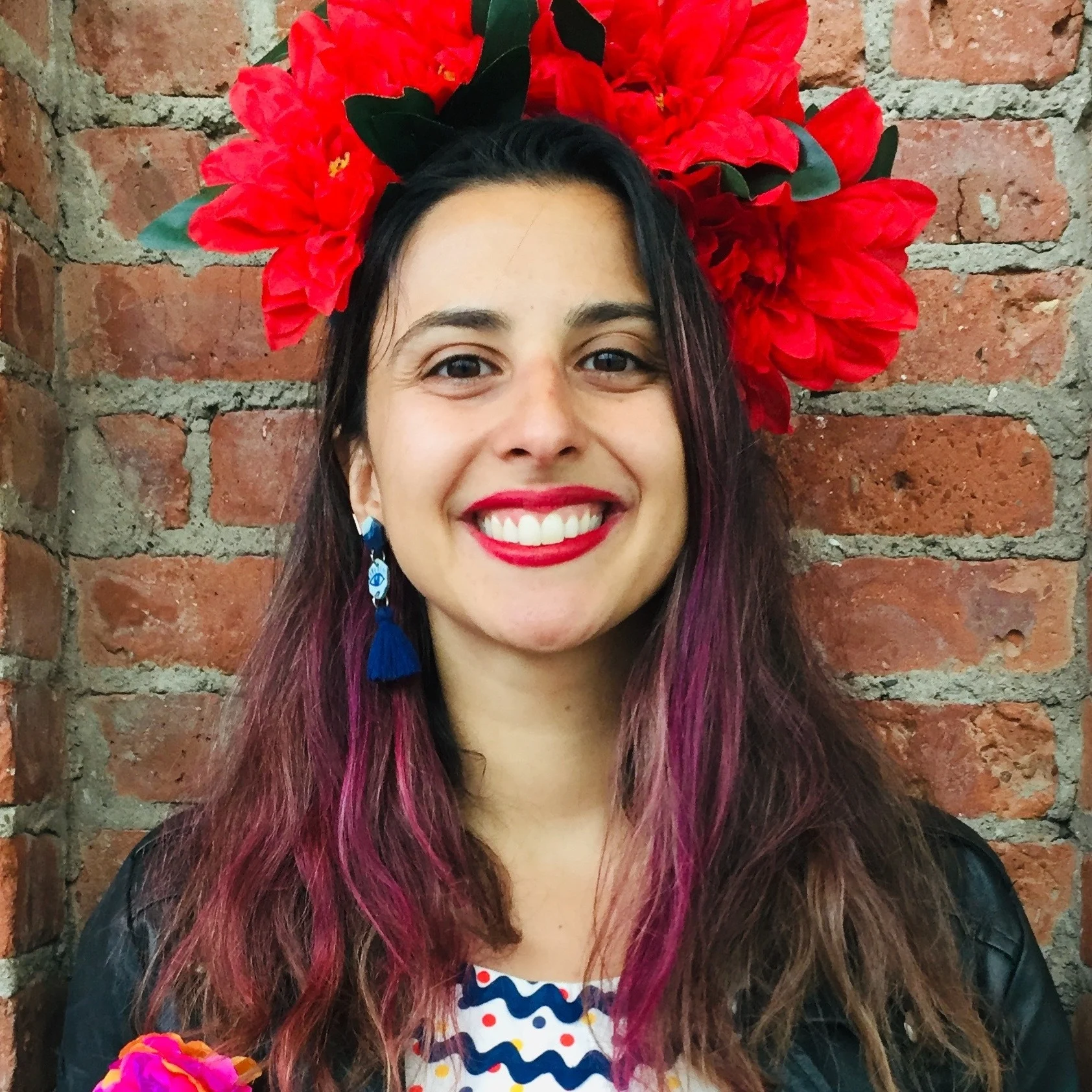Stay in the know
All our latest podcasts delivered right to your inbox.
What if you loved coffee so much that you made it your career? That’s exactly what David Rubinstein is doing — and it’s working for his ADHD and dyslexia.
In this episode, David shares how his unique combination of interests and learning differences led him on a career path with stops along the way as an electrician and as a champion cyclist. Today, as a coffee professional, he packs four jobs into one: barista, espresso machine technician, roaster, and teacher of all things coffee. All that action keeps David on his toes and engaged.
David also talks about growing up with ADHD and dyslexia in a conservative Orthodox Jewish family. He explains how he was able to find community and understand his passions, and he encourages others to do what they love. Learn about how David’s differences have been his biggest strengths — from speaking five languages to getting things done like Flash Gordon. And pick up a coffee fact or two along the way!
Related resources
Episode transcript
David: When I was in the eighth grade, I wanted coffee in school, and the coffee that they had was, like, really terrible. So what I did is I borrowed my dad's angle grinder, and I cut a hole in the back of my locker so that I could run the wire to my coffee maker from my locker to the outlet that's hidden behind the lockers. That hole is probably still there.
Eleni: From the Understood Podcast Network, this is "How'd You Get THAT Job?!," a podcast that explores the unique and often unexpected career paths of people with learning and thinking differences. My name is Eleni Matheou, and I'm a user researcher here at Understood. That means I spend a lot of time thinking about how we find jobs we love that reflect how we learn and who we are. I'll be your host.
Many of us like to start our days with a good cup of coffee. I know I do. But what if you love coffee so much that you made it into your career? Today's guest, David Rubinstein, has done just that. He's a barista and espresso machine technician, a coffee roaster, and a teacher of all things coffee. David also has dyslexia and ADHD.
We're going to talk about why having these four roles works for him and his learning differences. Full disclosure: We've been friends for a few years. I've been able to visit him at work and see him in action. So I'm excited to have him on the show. Welcome to the show, David.
David: Thank you. It's good to be here.
Eleni: So you're in a job right now where you perform a number of different roles. Do you want to talk a little bit about what each of those roles are and why they appeal to you in context of the way your brain works and the way your body works?
David: I work in coffee in a bunch of different ways. So I guess the most customer-facing would be that you'll see me behind the bar. I also fix espresso machines and install them and do all sorts of tech work around maintaining and upkeep of coffee equipment, as well as roast coffee on occasion and teach classes mostly in the coffee tech part of the job.
And I guess they all appeal to me because I can take this one thing that I love and kind of work it into four different jobs, which kind of keeps me interested and stimulated. And they're all with my hands, which is great — or teaching, with my mouth, I guess, but also really like showing people is, is part of the way that I teach. So again, still with my hands, and then, yeah, that feels really good for me.
Eleni: Yeah. Do you want to talk a little bit about why working with your hands feels good and perhaps how it might relate to some of your differences?
David: Being able to work with my hands means that I don't have to really, like, think in the same way as if I were, like, working with a computer or something like that and looking at a screen. Where I get kind of this tactile feedback that really, like, works for me and helps me understand what I'm doing. The more I have something in my hands, the more I feel it, the easier it is for me to, like, retain that knowledge and do it again and do it better and repeat it, and yada yada.
Eleni: Yeah, definitely. Do you want to talk a little bit about what your differences are and how that might relate?
David: Yeah. So I was diagnosed as dyslexic from early childhood, and that was, like, always, you know, trouble in school and kind of having the words jump off the page and all that. I remember, like, copying exercises from the blackboard, like, one letter at a time and losing my place every single time and just being so infuriated with that whole process.
I also recently discovered that I have ADD or ADHD, and that's been really interesting and has put, like, my, all these different, like, times in my life into perspective in a way that I never had before and always just was kind of confused by. But even today, like having a conversation with somebody and all of a sudden having this, like, urge to, like, run out and do this one thing and then want to come back to the conversation, I kind of now have an understanding of, like, where that comes from. And that's been super powerful and great.
Eleni: Do you want to talk about whether there have been any reflections that are related to, like, job or career choices?
David: Yeah, for sure. I think the job that I have today, like, I don't read anything. I don't organize any numbers or letters. I'm really happy about that. And I'm sure I picked that career subconsciously, knowing that, hey, I can't do that. Or consciously, I guess that falls into the dyslexia part of it. And also like having four roles within my company, I think that really speaks to my ADD side and being, like, I would not be able to stay with this job if it didn't continuously keep me stimulated. So being able to, like, pick a career that has that is, you know, super powerful. A career that, like, I kind of don't have to — that, that my, my different learning style doesn't limit me. In fact, it probably is a boon.
Eleni: Yeah. And I think that you're in a pretty unique and, like, lucky position in the sense that your challenges don't come up for you at work. Now that you're a little bit more aware, are there any deliberate choices that you're making when you're thinking about how your strengths or challenges might translate into day-to-day work?
David: An interesting question. I think moving forward that's definitely something I'm going to keep in mind as I navigate career and work. And today I think, like, there's, like, this understanding of, like, a task at work that I might delegate to someone else.
And I think, like, those instinctual choices have served me really well in the past. I don't do my own scheduling. I don't do my own billing. I don't do my own ordering. Uh, anything, like, along those administrative lines, somebody else takes care of. And I get to focus on the things that I'm good at, like the work with my hands, the understanding of these complex mechanical things, interaction with people. Say, like, a cafe shift, there's a line out the door and you have to make a thousand drinks in 10 minutes and being able to have this almost Flash Gordon–like speed to execute.
Eleni: Do you want to explain what Flash Gordon is?
David: Yeah, so Flash Gordon is, like, a comic book slash movie character. The Flash. Who, you know, is super speed everything. But also the, the whole word came about from my partner, who would be, like, in the kitchen, like, you know, chatting or whatever. And she'd be like, "Oh, can you wash the dishes?"
I'll be like, "Yeah, sure." And then like 10 minutes later, she'll be like, "Hey, what? How are the dishes done? You were in front of me the whole time. I didn't see you do it." Or something along those lines and just this, and I think, like, my co-workers sometimes feel it also, where they'll, like, turn around and be like, "It's all done already?" That's Flash Gordon-ing.
Eleni: Another thing that we've talked about in the past is acknowledging that maybe management isn't for you and turning down some of those opportunities. Do you want to talk a little bit about that and why you haven't gone in that direction?
David: I really enjoy human connection and being able to kind of be at eye level with everyone around me. And I think, like, some of the managerial roles that I have been offered kind of would, like, change that and, like, create this kind of power dynamic that doesn't allow me to have that eye-level relationship that I really want with everyone around me. And you mentioned that, like, not everybody has, has found their — a way to make all their strengths work for them. And you know, their learning differences are apparent in some of their work. And I think, like, everybody has that to some extent. And even me, like, I'm going to be looking for other opportunities in the future, and there's going to be things that don't perfectly align. And it's just a continuous navigation through life of figuring out what works and what doesn't.
Eleni: Yeah, definitely. It's all an experiment. Well, I know you talked a little bit about coffee machine repair, and I think you called it the "coffee tech" side of things. And I think that's such an interesting niche and something that I didn't really know there was a demand for or that there was a field in this. Do you want to talk a little bit about how you discovered it and why you like it?
David: Yeah. My family is very crafty, I guess is the best word. And I was an electrician for a little while and did some of that, and then did not enjoy the fact that it didn't have that human experience and that human connection. So I wanted to move away from that, and I knew that coffee was a passion of mine, and I wanted to see how I could work in that space but still make rent, because coffee doesn't pay a lot of money. So it was kind of, like, an understanding of, oh, here's an interesting skill that I have through electric work. Can I kind of at least say that I know how to fix espresso machines well enough to get some hands-on experience in the field on my own? And then I actually know how to do it now. So there was a little bit of that, and, yeah, that was kind of, like, the — you know, I had a friend that once told me that you're never, you're probably not going to be the best at anything. But if you take this interesting combination of all the things that you're pretty good at, you might be the best at this combination.
So I kind of, like, thought through that. I was like, well, I like coffee. I'm pretty good with my hands and technical stuff. I know some electric work. Should probably poke around them, the inside of the things that are making the coffee. And that's kind of how I landed where I am.
Eleni: I've heard you refer to it as kind of like being the coffee equivalent of a car mechanic, maybe.
David: Yeah. You know, cars need yearly maintenance, your espresso machine needs yearly maintenance. They both have plumbing. They both have electric. They both have a power source.
Eleni: Do you kind of feel like there's an element of, you know, problem-solving or, like, detective work of like, "Ooh, what happened? What can I do?"
David: For sure. It's like, is it clicking in this way? Is it not clicking in that way? Is there steam coming from here or not? That's kind of like, you know, like the plumber will come to your house, you know, will, like, bang on the wall, hit a little pipe, and everything will start working again. And then charges you a thousand dollars. And you're like, "Why is that a thousand dollars?" And he's like, "Because I knew where to hit. You didn't." And that kind of, like, speaks to, you know, the experience in the field and figuring out how to do that.
Eleni: Does it translate as a skill into other areas?
David: I wish it did more. They're pretty specialized. It's pretty nuanced. And the places that it does translate to, I — you know, I guess I know plumbing now. I don't really plan on being a plumber, so, yeah, I wish —
Eleni: Can you fix your own kitchen sink, though?
David: I definitely can.
Eleni: That's helpful.
David: Yeah.
Eleni: Helpful life skill.
David: For sure.
Eleni: And you talked briefly about loving coffee. Do you want to talk a little bit about what you love about coffee and maybe some fun facts around coffee that you like to share with people?
David: Sure. So what I love about coffee is that it's drank by so many people all around the world, and it's kind of this unifying human experience that is shared by so many. And that, like, leaves room for, like, amazing conversation and amazing connection, which, you know, it's kind of, like, almost, like, connection through coffee, as opposed to just this brown water that we drink.
And I love the taste. I think it's delicious. I'd probably be — I don't know where I'd be without caffeine in my life. So that's, like, some of the things that I love. Um, interesting facts. So if you look at your whole coffee beans and you flip — there's the round side and the flat side, and the flat side kind of has this indent in it. So if it has a lighter-colored inside of that little crack, then they used water to process it. And if the indent inside is the same color as the rest of the coffee bean, that means that it was dried on beds, kind of like concrete slabs that the coffee's, like, spread in a single layer to dry the fruit out so that they can then easier remove the pit from it. Other fun facts? Um —
Eleni: The tasting notes?
David: Tasting notes are, like, super subjective. Everyone has their own, and —
Eleni: You said something about there's more tasting notes in coffee than wine or something. Is that a fact?
David: Yeah. There's three times as many tastes that are recognized. Over a thousand different tastes in coffee and only a little over 300 in wine. So you can say that it's three times more nuanced than wine, although I'm sure some wine people will get very upset at that.
Eleni: Maybe we'll have a wine person on the show as another episode.
David: There you go. They can, they can give their rebuttal. Oh, and the world's largest coffee-producing country is actually not one that you'd think it is. And I might be getting, this might be the second largest, not the largest, um, but it's actually —
Eleni: Oh, I think I know the answer to this.
David: Do you? What do you think it is?
Eleni: I think it's Vietnam.
David: Yeah, you're right. It is.
Eleni: Yeah, winning in trivia!
David: Um, but everyone's like, oh, Colombia or Brazil, but no, it's Vietnam.
Eleni: I remember being surprised by it because I would've thought it was, like, Colombia or Guatemala or somewhere in Central or South America.
Is there a story around how you kind of became focused on coffee and how that interest became so prominent?
David: So when I was in the eighth grade, I wanted coffee in school, and the coffee that they had was, like, really terrible. So what I did is I borrowed my dad's angle grinder, and I cut a hole in the back of my locker so that I could run the wire to my coffee maker from my locker to the outlet that's hidden behind the lockers.
Eleni: That is ingenious.
David: That hole is probably still there.
Eleni: Oh my God. Was it ever discovered?
David: No, it wasn't, actually, but there was definitely, like, classmates of mine, they were like, "Oh, you have coffee? Can I get a cup?" But yeah, no, no, I never got, like, in trouble or anything for it. It was my little secret.
Eleni: Well, that's an early indication of some interest in electrical work.
David: I suppose.
Eleni: Well, I think that that was actually a good segue because I was going to ask you. You know, you have this interest in coffee. Do you want to share some other hobbies or interests that have kind of come up throughout the years and whether they led to other jobs and career paths?
David: I was a professional cyclist for a point that led to almost a professional career path, but not quite.
Eleni: Do you want to talk a little bit about that story?
David: Yeah. I found that the intense physical exercise to kind of, now I realize after this ADD diagnosis, I'd be like, "Oh, that's what I was doing to kind of, like, quiet the mind and quiet the body and kind of have this, like, intense physical space to kind of, like, let all that extra energy go."
And I became like really, like, addicted to this, to this release, and ended up cycling for a, like, local cycling team here in New York and racing and during all of that, which led to my team sending everyone on the team to a training camp in a different country of your choosing. And I had some friends that I was visiting in Israel. So I chose to go there for my training camp, which led to me speaking to the Israeli national team to join their team, which led to a whole new life experience. And so I kind of, like, did not get back on my return flight to the States and ended up staying there for five years.
Eleni: Which maybe talks a little bit to, I don't know, going with the flow of the moment, perhaps.
David: Maybe.
Eleni: I know you grew up in, you know, a fairly conservative Orthodox Jewish community. Do you want to talk a little bit about that, and how and if that played a role in your understanding and acceptance of some of your differences?
David: I think that, like, mental health is really not spoken about in a lot of, um, conservative communities, or it's overlooked, when it's just like, "Oh, you should just turn to God." Which is not really a helpful way of, way to put it. So I think there was definitely some of that, which I was like, well, "I turned to God and it didn't work for me. So maybe let's try something else." But also, like, at the same time, like what is 20 years ago, research was just coming out about like neurodivergence and dyslexia, and especially, like, within more insular communities, which are always 10 years behind, at least, on everything. So there was nothing. So that was never really, like, spoken about, discovered — no one ever like tested me for ADD. Um, and so that was unhelpful.
Eleni: So I'm curious how you ended up with your dyslexia diagnosis.
David: I think it was more like, oh, we were trying to, like, study, like, the Talmud and the Torah for many hours a day. And it got to this point where it was very, very apparent and very clear that I could not read one letter of it.
My mom is in the teaching field. So I think that was, like, kind of her push to, like, see where this is coming from. And then once I did get the diagnosis, not much was really done with it. And it was like, "Oh, you're dyslexic. Cool. Still, read the Talmud. Have fun." So I, yeah, so, like, I think there was kind of, like, this, even though you have the letters, um, or, you know, you're dyslexic and you have this learning difference, I don't think there was any understanding of like, "Oh, let's do something about it." It was kind of ignored.
Eleni: Do you think that anything in particular happened that helped you shift away from, you know, the stigma of that and being a little bit more open and, like, getting to the place where you're comfortable enough talking about it on a podcast?
David: Yeah, I definitely think there was. I think the biggest one was when I came back to the States, I was really looking for community. And I had been exposed briefly to partner acrobatics, or AcroYoga, when I was living in Israel. And when I came back to the States, I kind of found my community through that. And that's a space that very much, like, um, celebrates communication, openness, working through problems. It's very collaborative. And I think just being in spaces like that really helped me both look inwards because there's a lot of introspection in, like, "Oh, why didn't this work?" or "How can we make this better?" And just again, being around people in places that celebrate individualism really, really helps with coming to your own individualism and really celebrating that.
Eleni: What have you come to, like, love and appreciate about your differences?
David: Oh, that's such a good question. I really, like, love this ability to, you know, you have a task list of 15 things and to just like, you know, one after the next, just go, go, go, go, go, and get it all done. That's, like, that sense of accomplishment is really great. And I really enjoy that ability.
Eleni: What about, what about from the dyslexia?
David: I don't know if this is connected, but I do have, like, I'm really good with languages. The spoken word is, like, much, much more — maybe, like, that part of my brain developed a little bit more to kind of compensate.
I speak three languages and understand two others, and they all come really easily and naturally to me.
Eleni: What languages are they?
David: I speak English, Yiddish, and Hebrew, and I understand German and Arabic.
Eleni: Wow. I didn't know that. How did you go about learning those languages if you couldn't necessarily read in those languages?
David: I think just, like, more immersion. I still can't read any of those languages, but just being, hearing them around me and kind of, like, facial recognition and context, it really comes pretty naturally to me.
Eleni: Super cool. I wish I could do that. At some point in the conversation, you mentioned, you know, like, eventually you might be looking for the next thing. So I would love to hear your philosophy around jobs or careers, and, you know, what you're thinking in the long term.
David: Yeah, I think that there's, like, two different ways to approach work. There's the "I want to do the thing that I love" or "I want to make enough money to do the things that I love." And I'm pretty well rooted in the "I want to do the thing that I love" camp. Doing a job that pays well that doesn't fill me — it just feels really exhausting and draining. So I think it's kind of, like, take all of these, like, unique combinations of yourself, like, all the different things that you love, throw it on a sticky note, throw it on the wall, and I'm sure over time, like, the right thing will, will come to you.
Eleni: Yeah. That's great advice. Thanks for being here, David. I was going to say, do you want to say "thank you" in all five languages?
David: Shukran. Todah rabah. Danke. Adank. Thank you.
Eleni: This has been "How'd You Get THAT Job?!," a part of the Understood Podcast Network. You can listen and subscribe to "How'd You Get THAT Job?!" on Apple, Spotify, or wherever you get your podcasts. And if you like what you heard today, tell someone about it.
"How'd You Get THAT Job?!" is for you. So we want to make sure you're getting what you need. Go to u.org/thatjob to share your thoughts and to find resources from every episode. That's the letter U, as in Understood, dot O R G, slash that job.
Do you have a learning difference and a job you're passionate about? Email us at thatjob@understood.org. If you'd like to tell us how you got THAT job, we'd love to hear from you. As a nonprofit and social impact organization, Understood relies on the help of listeners like you to create podcasts like this one, to reach and support more people in more places. We have an ambitious mission to shape the world for difference, and we welcome you to join us in achieving our goals. Learn more at understood.org/mission.
"How'd You Get THAT Job?!" was created by Andrew Lee and is produced by Gretchen Vierstra and Justin D. Wright, who also wrote our theme song. Laura Key is our editorial director at Understood. Scott Cocchiere is our creative director. Seth Melnick and Briana Berry are our production directors. Thanks again for listening.
Host
Eleni Matheou
leads user research for Understood. She helps Understood to center its work on the lived experiences and voices of people who learn and think differently.
Latest episodes
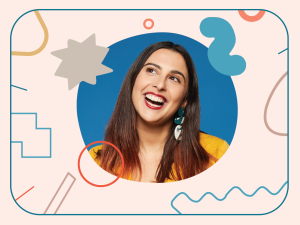
June 28, 2023
In the series finale of How’d You Get THAT Job?!, host Eleni Matheou unpacks what we’ve learned about how people thrive at work.

June 14, 2023
Nathan Friedman is the co-president and chief marketing officer of Understood.org. And he has dyslexia and ADHD. Learn how he got into the C-suite.
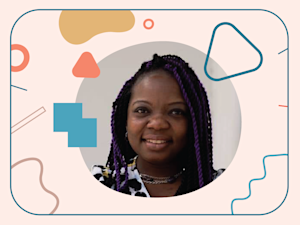
May 31, 2023
Dr. Loucresie Rupert is a child, adolescent, and adult psychiatrist with ADHD. She didn’t have an easy time getting her diagnosis as a Black woman.
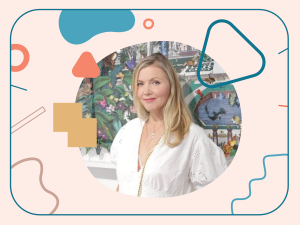
May 17, 2023
Kristjana Williams is a London-based Icelandic artist with dyslexia. She wasn’t diagnosed until she was 25, and now she has her own studio.

May 3, 2023
Aideé Chávez Frescas has ADHD, and is a senior social media manager at Understood. Her posts help end stigma and show others they’re not alone.
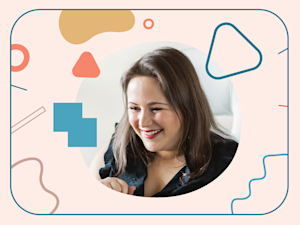
April 19, 2023
Alex Gilbert is a career coach with ADHD and dyslexia. After working in leadership development for years, she started her own coaching business.
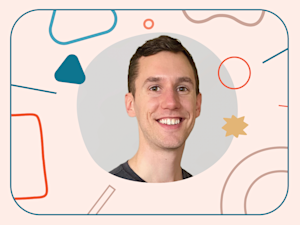
April 5, 2023
Dan Reis was diagnosed with ADHD during the pandemic. Now, he’s made it his mission to explore coping strategies to help him get his work done.
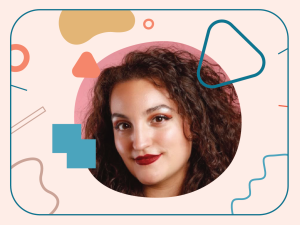
March 22, 2023
Rachel Basoco’s two jobs keep things interesting for her ADHD. She works full time at Fidelity, and part time at 11:11 Media, Paris Hilton’s company.
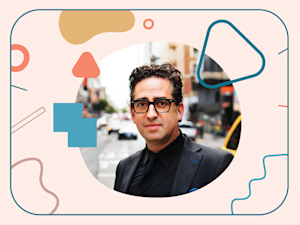
March 8, 2023
Gil Gershoni says that everything he does is dyslexic. He founded the branding firm Gershoni Creative and hosts the Dyslexic Design Thinking podcast.
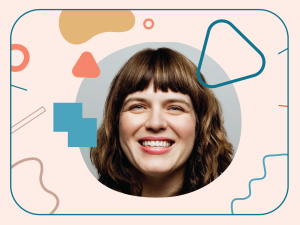
February 22, 2023
Claire Odom is a psychotherapist with ADHD. She’s also a disability inclusion consultant who has advice on navigating the workplace.
